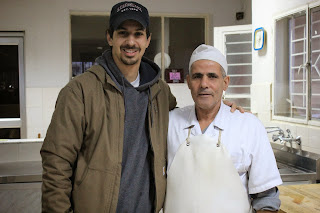This week I said a goodbye to a friend. It wasn't a final goodbye, but a difficult
one nonetheless. Camille was hired on
staff at Dar El Awlad in 1984 by my grandfather and spent nearly 28 years
serving at the ministry, first as a gardener and then as a cook. Over the decades he prepared (literally) tons
of food, watched many dozens of boys grow into men, and saw volunteers from all
over the world come and go. He was the
last staff remnant of my grandparents’ time in Lebanon, and when he walked off
site the final time the chapter on an era officially closed. It’s not just the link to a nostalgic pass
that I have said goodbye to; it is a friend.
Most of my days for the past six years have started with a “hello,
how are you?” from Camille as I popped into the kitchen to give a morning
greeting. Over the years we shared running
jokes about solving the problems of Dar El Awlad first and then sorting out the
Middle East next, lessons on agriculture, updates
on family, and discussion on the many things that fill this life between birth
and death. We gathered together in his
mountain village and shared meals at his home in the city. There were funerals and weddings, visits
during holidays and drop-ins after surgeries.
There were goodbyes and there were welcome backs. There was a season-through-season friendship.
Making a change now is good and right. Camille’s kids are all grown, and he still
has health and strength to spend time working in the village and tending to his
lands. His home in the city is near and
it’ll be easy to him call up or stop by for a visit. Community circles are small around here; our
life has many more intersections to come. But I’ll miss Camille’s daily presence at the ministry. I’ll miss his interactions with the boys, his
philosophical offerings for any situation, and his genuine concern about family
and loved ones. These coming days I will
find myself facing something new. It’s
something small, but still something I haven’t had to experience during my years
at Dar El Awlad. I’m thankful that God
brought us Camille nearly three decades ago, and I’m thankful that he has
remained a consistent presence ever since. May God help those of us remaining to likewise
tarry on with steadiness and faithfulness, just like my friend Camille.






